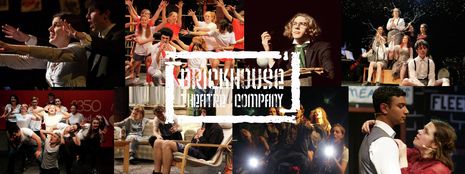Robinson’s Brickhouse theatre president: twisting traditional theatre
Conversation with Max Mason illuminates the space for student theatre’s voice in engaging with contemporary narratives

In the midst of fiery debates about political correctness on the stage and an increasingly competitive world of new writing, Max Mason navigates complex decisions in his role as Brickhouse Theatre President. He highlights how powerful theatre is in shifting the societal landscape.
When considering what shows to put on, Max says he takes a keen interest in those that “push the envelope a little” and allow scope for reinterpretation. He praises the experimental ambition of new writing but is particularly interested in pitches that allow one to take a traditional text and “breathe new life into them”. Brickhouse’s auditorium is perhaps most renowned for its intimate renderings of twentieth century productions, such as the brilliantly received All My Sons. Max pointedly rejects the idea, however, that you can be a “purist” of any original. Instead, he believes that theatre has a responsibility to reanimate these texts for the contemporary audience.
“Theatre has a responsibility to reanimate these texts for the contemporary audience”
Max chuckles, describing how the “theme” of his Cambridge career has been trying to bring more traditional institutions - Shakespeare and opera, for example - into a modern context with “modern resonances”. For Max, this involves defying the categories of theatre that we often use to delineate the dramatic world; a reflection of our increasingly spectral society.
“The best theatre is the one you can’t put a genre on”, Max claims. He dedicates his space to these “genre-bending” plays. While there are plenty of experimental pieces of new writing - he offers Jeremy O’Harris’ Daddy: A Melodrama as an example - many canonical works can also seem to defy traditional categorisations.
“The best theatre is the one you can’t put a genre on”
When I slip up, referring to “gender” rather than “genre” bending, Max then informs me they derive from the same etymological root. It’s an interesting parallel, showing the close relationship between experimentation in theatre and in social life. It’s just one example of the way in which these traditional institutions can be reanimated for a society ever inclined towards rejecting binary institutions.
Shakespeare is an obvious example of the experimental relevance within the canon. Brickhouse theatre’s annual Open Air Shakespeare productions in May Week has illuminated this. Max directed both A Midsummer Night’s Dream in 2022, and Love’s Labour’s Lost this past year. He explains that he committed to “gender-neutral and gender-active casting.” While some object that this casting strays from the original text, Max argues that it tests an established narrative in a way that theatre has a responsibility to do. He claims that it is impossible to be a “purist” of any artistic production.
“It is impossible to be a ‘purist’ of any artistic production”
Max’s experiences in opera, an art form often regarded as rather exclusive and inaccessible, also testify to the way in which we can reinvent these traditional institutions. He suggests that through “interesting production visions” such as those employed in his royalist rendering of Handel’s Semele in Easter term, and by making it more financially accessible, we can translate opera for the modern audience. You should keep an eye out for Max’s upcoming rendition of Handel’s Saul. He explains that by exploring a Jewish identity narrative he plans to bring this Baroque opera “kicking and screaming” into the modern day.
We return to new writing and how it can defy these theatrical categorisations and engage in established narratives. Max is interested in pitches for Brickhouse’s theatre that shed new light on old conversations. His own musical, Foresight, explores the AIDS crisis through the lens of 90s author-translator, Giovanni Pontiero. Staging a poignant portrayal of queer expression, it promises to elucidate an often-forgotten factor in any literary production: artistic translation.
Despite the professional culture that Cambridge theatre cultivates, and perhaps overly-emphasises, Max highlights that ultimately “we are all learning”. First night flops are not artistic failures. Max suggests that what is most impressive about Cambridge theatre is its dedication to both process and finished product alike. Actors and crew are offered the same revered space, something this Behind the Curtain series hopes to illuminate.
In my conversation with Max, it is clear that the stage is ever engaged in galvanising the narratives of the past. Impressively accessible to all, there is a space for everyone’s voice in Cambridge theatre.
Keep up to date with the Brickhouse Theatre Company here.
 Comment / Plastic pubs: the problem with Cambridge alehouses 5 January 2026
Comment / Plastic pubs: the problem with Cambridge alehouses 5 January 2026 News / New movement ‘Cambridge is Chopped’ launched to fight against hate crime7 January 2026
News / New movement ‘Cambridge is Chopped’ launched to fight against hate crime7 January 2026 News / Uni-linked firms rank among Cambridgeshire’s largest7 January 2026
News / Uni-linked firms rank among Cambridgeshire’s largest7 January 2026 News / Cambridge businesses concerned infrastructure delays will hurt growth5 January 2026
News / Cambridge businesses concerned infrastructure delays will hurt growth5 January 2026 Features / Who gets to speak at the Cambridge Union?6 January 2026
Features / Who gets to speak at the Cambridge Union?6 January 2026









